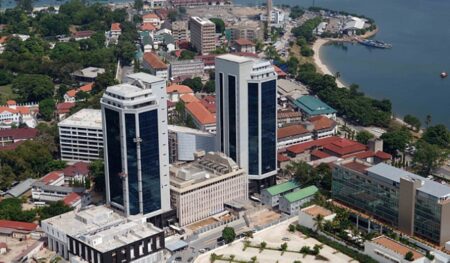- Kenyan companies saw renewed deterioration in business conditions in April 2022, on the back of a decrease in customer demand in response to rising consumer prices and living costs
- The Purchasing Managers Index (PMI) survey by Stanbic Bank indicates that the decline in operating conditions was underlined by a renewed fall in new order volumes
- The Stanbic PMI reading fell below the 50-point neutral mark in April to 49.5 from 50.5 in March
A new report shows that Kenyan companies saw renewed deterioration in business conditions in April 2022, on the back of a decrease in customer demand in response to rising consumer prices and living costs.
The Purchasing Managers Index (PMI) survey by Stanbic Bank indicates that the decline in business conditions, which was the quickest seen since April 2021, was underlined by a renewed fall in new order volumes.
According to survey panellists, lower sales was the principal driver of a fall in activity, with some also mentioning a lack of cash and delays in the delivery of inputs.
Sector data showed that the downturn in business conditions was concentrated in construction, agriculture, and services.
“Economic activity in Kenya contracted in April due to rising inflation and supply shortfalls that negatively affected consumer demand and firms’ output,” said Kuria Kamau, Fixed Income and Currency Strategist at Stanbic Bank.
During the month under review, the Stanbic PMI reading fell below the 50-point neutral mark in April to 49.5 from 50.5 in March.”
The survey also found that customer demand was limited by rising inflationary pressures, as companies saw a decline in new order inflows for the first time in three months.
In particular, respondents stated that increased fuel prices and selling charges had led clients to lower their spending.
“The overall reduction in sales was only fractional, as declines in the agriculture and construction sectors contrasted with growth elsewhere,” the survey noted.
Fertilizer shortage to increase Kenya’s international flower prices
Export orders
Stanbic Bank also noted that the overall upturn in export orders was only modest in April, as respondents again highlighted a negative impact on demand from the Russia-Ukraine war.
At the same time, Kenyan companies were able to maintain a stable level of incomplete work at the start of the second quarter of the year, after signalling increases in each of the previous two months.
According to panel members, lower intakes of new work and increased staffing led to spare capacity, but delays in the delivery of goods offset this.
Job creation
The survey also found that Kenyan companies maintained a stable level of incomplete work at the start of the second quarter of the year, after signalling increases in each of the previous two months.
Panel members noted that lower intakes of new work and increased staffing led to spare capacity, but delays in the delivery of goods offset this.
At the same time, overall wage costs at Kenyan businesses rose for a second consecutive month in April, with the rate of inflation picking up to the highest since June 2021 but remaining marginal.
While there were some reports of firms increasing salaries in line with higher living costs, most respondents saw no change in their labour expenses.
Stanbic Bank also noted that purchasing activity in the Kenyan private sector economy continued to expand in the period under review, although the growth rate slowed for the second month running and was only modest.
According to survey panellists, the slowdown was primarily related to a renewed drop in sales, although some also mentioned price increases. Construction firms bucked the broader trend to post a drop in buying activity.
At the same time, the survey noted a continued increase in costs related to the purchase of inputs at Kenyan firms, despite dropping slightly from March’s over eight-year high.
Survey panellists highlighted several factors, most notably the impact of supply shortages of fuel, food products, and raw materials linked to the war in Ukraine.
Sharp rises in purchase prices were seen in all five sectors covered by the survey.
Firms also noted that suppliers were generally willing to speed up deliveries to win clients but that shortages of fuel and other items and as delays at ports had impacted delivery schedules.
The drop in lead times was the second-weakest seen in the current 23-month sequence of improvement.
Inventories of inputs at Kenyan private sector companies also increased for the third successive month in April.
The uplift was solid despite easing to the softest seen in this period. Where higher inventories were recorded, panellists often reported concerted efforts to build safety stocks amid fears of future supply shortages. However, higher prices and lower sales partly offset these efforts.
Inflation cuts short improving business conditions in Kenya











